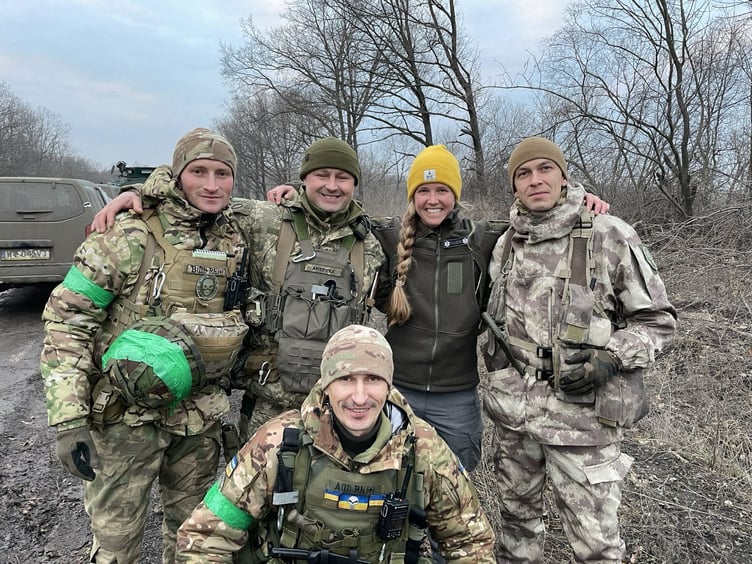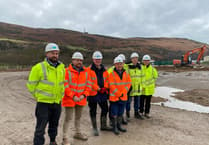Bomb disposal specialist Chris Garrett has returned from Ukraine after more than three years of volunteering there.
Chris, from Peel, was a tree surgeon before he became the chief explosive ordnance disposal instructor for the International Volunteer Bomb Disposal Unit.
He came home as he and his partner, Courtney Pollock, a volunteer paramedic in Ukraine from Colorado, in the United States, are now expecting a child.
Chris said: ‘It made sense to get out of an active conflict zone, move back here and try to get our lives sorted out.
‘We met in early January. I was working and got introduced to Courtney, they were looking for some help on the ground to get established in that area.
‘I just offered support in the background. Maybe a little too much support,’ he joked.
Courtney was the working partner of Pete Reed, a former US Marine who died evacuating civilians from the city of Bakhmut in Ukraine.
The couple found out that they were expecting in February.
Chris, known as Swampy to his friends, said: ‘Initially we were going to stay out there and work for a few more months but when I sat down and thought about it, every day you’re rolling the dice, especially where we were working.
‘If one of us got hurt, or worse, it was going to create a much worse situation out of what had turned out to be a good thing.’
After ensuring that the team he was working with was left in good hands, Chris left Ukraine and made his way back to the Isle of Man.
He said: ‘I might have left Ukraine but Ukraine will never leave me. The phone still goes and the messages still come in.
‘It’s not something you can switch off from, not when you’ve had that level of involvement for so long.’
Having volunteered in Ukraine between 2014 and 2017, Chris returned just two days after the Russian invasion last year.
In that time Chris has seen many things that people go their whole lives without seeing.
When asked about any moments that stuck out, he said: ‘I think the last three to four months of work were probably the hardest because the bulk of it was on the front lines so the threat level was increased massively.
‘Things like that stay with you and you’ve just got to try to adjust back into normal life and remember the good parts of it.’
For many veterans of war, coming back is a challenge and the return to civilian life can be hard when coming from an area of conflict.
Chris said: ‘When you’ve been living in a semi-charged state for months and months, it takes a long time for the body to settle itself, even if you think your mind is fine.
‘You don’t realise the actual physiological your work has had on your body. I’m starting to put some weight on which is good as I was very gaunt when I came first came back.’
Chris worked in Bakhmut, Solodar and Chasiv Yar during his time in Ukraine.
He said: ‘It’s good to get home and resettle a bit and try to put some weight back on.
‘Right now we’re just getting Courtney sorted out and settled in here, we need to start going down the route of work visas and everything else.
‘I’m going to have to get back into work but I don’t feel like I’m ready to throw myself back into a normal job right now.
‘It’s not easy but it becomes a financial point where I’m going to have to work.
‘But we’re just finding out feet again and preparing to have the baby, which sounds a bit scarier to me than clearing land mines to be honest, but we’ll see how that goes.’
When Chris came back, he was excited to see his family and friends but knew we had the task of breaking the news to his mother, Hazel Garrett, that she was going to be a grandmother.
He said: ‘I think she’s just happy to have me home and know that we are safe.
‘It’s been much easier this time (being away in Ukraine) because there is so much media coverage of it.
‘My mum’s had a much better idea of what I’ve been doing and where I’ve been working.
‘I think this time she understood my needing to go back and it has been had to step away too.
‘My friends and their families are still out there, it’s hard to just switch yourself off from it all with social media but it’s just nice to be home.’
Chris was not a soldier in the Russo-Ukrainian War but a volunteer, helping to clear land mines and explosives that were planted by Russian forces in the eastern European country.
He said: ‘It’s strange coming back. Obviously there’s a lot of people who knew what I was doing out there and then you bump into people in the street and they said, “Oh you’re back from killing Russians then?”
‘It wasn’t my job to kill Russians and, obviously, some people don’t have a clue what I did with my time.’
Despite their new family responsibilities, both Chris and Courtney have not lost their desire to help people in conflict zones.
Chris said: ‘With us having a baby, it’s a bit tricky, I have been offered a couple of contract jobs in different places, but at the moment, it’s not something I’m willing to do.
‘It’s not something that I can just drop everything and go and do. Courtney’s a paramedic and we met because she wanted to be in that kind of environment so whether it’s Ukraine or not, I can’t promise that it’s going to be our last conflict zone.
‘We just need to get established as a family first and then talk through it. It is something we have spoken about and I know that she would like to continue that route of supporting in the future but I think we need to be a bit more careful with where we are working.’


.jpg?width=209&height=140&crop=209:145,smart&quality=75)

.jpg?width=209&height=140&crop=209:145,smart&quality=75)